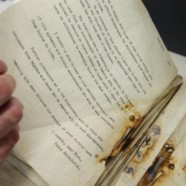Saving Iraqi Jewish artifacts
In May 2003, US troops searched the Mukhabarat, Saddam Hussein’s former spy headquarters in Baghdad, for weapons of mass destruction.
They didn’t find any weapons.
But in the flooded basement, soldiers DID find thousands of materials connected to Iraq’s once-thriving Jewish community.
The collection was both comprehensive and random. Everything from religious artifacts – Haggadahs for the Passover Seder, prayer books, various sections of the Torah – to photos, letters and government records dating back to the years of British colonial rule.
All of this material, some of it hundreds of years old, was nearly ruined for posterity by the floodwaters.
The US-led Coalition Provisional Authority contacted the National Archives in Washington for help in cleaning and preserving the artifacts.
The interim Iraqi government soon signed on to the project, with the caveat that once everything was restored, that it all be returned to Baghdad.
And so the Archives obtained three million dollars in funding from the State Department and private sources, hired a team of preservation experts, and got to work.
Help from someone who was there
Maurice Shohet – the descendant of a Chief Rabbi – was born and raised in Baghdad.
He was shocked to learn the government had spied on him and other children – the evidence in the form of classroom registers listing him and his childhood friends.
Iraqi Jews suffered increased harassment and persecution in the late 1960’s, especially after the Six Day War.
Shohet said that drove his family to pay smugglers to get them out in 1970. It was a big risk, but eventually his family made it to the United States, and Shohet became a leading figure in a group that represents a community now scattered around the globe.
His group, the World Organization of Jews from Iraq, picked him to consult with the preservation team as it started its work.
Much of the restoration work is complete – mold remediation, pages repaired, bindings re-sewn.
24 of the artifacts were recently displayed at the National Archives in Washington.
They will soon be put on display at the Museum of Jewish Heritage in New York.
Afterwards, the materials will be returned to Baghdad – something the US agreed to do back in 2003.
But that bothers Shohet. He and others in the Iraqi Jewish Diaspora say they’d like to see the agreement between Iraq and the US renegotiated, this time, with the community at the table.
Shohet told us, “What came to be known as the Iraqi Jewish Archive were confiscated from the Iraqi Jewish community… accordingly, it’s the patrimony of our community, so we believe it has to be returned to our community here in the United States.”
A State Department spokesman told AL Jazeera, the US government understands Shohet’s concerns.
“The United States remains committed to returning the collection to Iraq in accordance with the 2003 agreement but we also understand the sensitivities surrounding these items and, in that regard, we are open to any discussion the Government of Iraq is willing to have on the future disposition of the collection,” the spokesman said.
He also said the State Department has reached out to the Iraqi Embassy to possibly extend the loan to the US so that all interested parties can view the relics.
For now the cultural heritage of a community 2500 years old will live online – for the entire world to see.
But that isn’t the same as a community possessing and caring for the very proof of its existence across centuries.
Shohet hopes that might yet come to pass.
Rosiland Jordan/Al Jazeera

